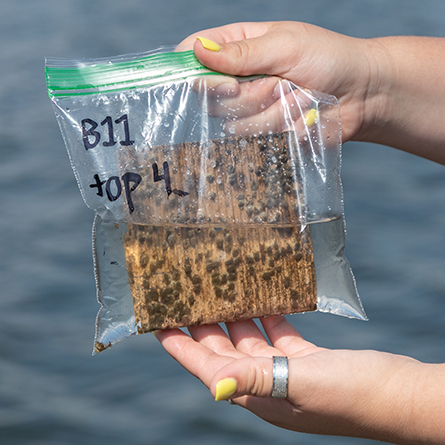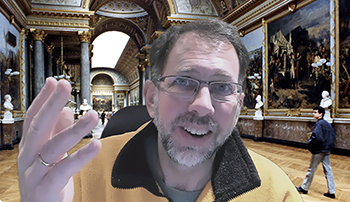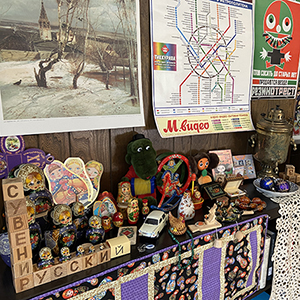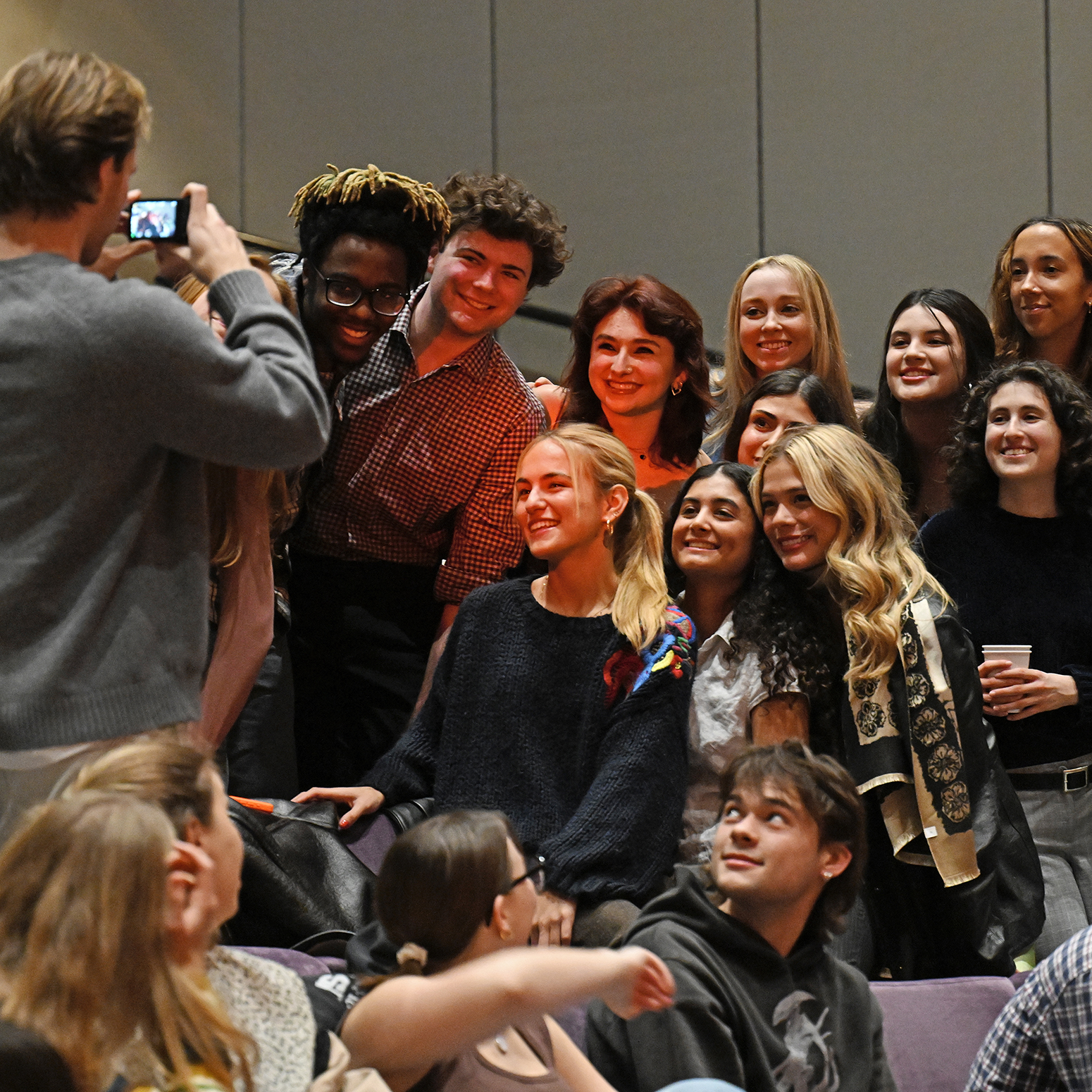
Faculty, students and staff get creative with remote teaching and learning

Professor of Art History Christopher Steiner was in the middle of teaching his “Current Issues in Museum Studies” course when the COVID-19 pandemic began and Connecticut College transitioned to remote teaching and learning.
Overnight, the “current issues” facing museums changed.
“We spent the first week of remote teaching talking about how museums have adapted during the COVID-19 pandemic. The students visited some online exhibitions, and we also talked about the financial struggles that lie ahead for all museums. Some of the readings are ‘breaking news’ literally from a day or two before class,” he said.
Steiner also pulled out a green screen he had once used for a photography project and began teaching his Zoom classes with virtual backgrounds from museums or important sites from around the world. When the class discussed the repatriation of the Parthenon Marbles to Greece, Steiner appeared with the Parthenon as his backdrop. During another class, “for no good reason,” Steiner says he decided he wanted to be at the Palace of Versailles in the Hall of Great Battles.
“In general, the students have adapted to online teaching. We have good class discussions, and I am able to share with them my PowerPoints and even short videos,” Steiner said. “The backgrounds are really just for fun, but the students have come to expect them now. So, I have to plan ahead to figure out ‘where in the world’ I will be.”
Steiner also got creative with the class’s final project: students are tasked with planning a hypothetical exhibition on COVID-19 that would be on display 2025.
“What would they want to be collecting now—signs, memes, masks, etc.? They have read about exhibitions on the 1918 flu pandemic that have taken place in the past few years, and did some research on the science of the virus. Their final projects are due at the end of the semester, and I really look forward to seeing what they come up with,” he said.
Souvenir shop
Laura Little, faculty director of the Global Learning Lab and lecturer of Slavic studies, said that while teaching language remotely has its challenges, it also offers opportunities to have conversations about everyday life that give students the chance to utilize different vocabulary in the language they are learning.
During one meeting, “since they were often appearing in the frame anyway,” Little invited her students to bring their pets to class. Students who didn’t have pets, are sheltering somewhere other than home or didn’t feel comfortable sharing were invited to bring a photo of a favorite animal.

“It’s exciting for students to be able to talk [in Russian] about personal things that matter to them,” Little said.
Little is also using her own environment to her advantage. Using tchotchkes she’s collected or been gifted over the years, she’s set up a souvenir shop in her home for her students to explore and practice asking questions and purchasing items.
As part of their final, students will have to visit the shop and a virtual café. While Little doesn’t yet know which items will prove most popular with her students, she says a particular stuffed crocodile playing an accordion is getting a lot of attention.
“Crocodile Gena is the hero of a cartoon we have been watching. He seems to be particularly popular, so we will see what happens,” she said.
Psychology students provide online mental health services
Before the COVID-19 pandemic, Margaret Kelly ’20 was working at Safe Futures in New London as a domestic violence and sexual assault counselor, as part of her “Practicum in Clinical and Community Settings” psychology course. But when Conn transitioned to remote teaching and learning, Kelly quickly learned to provide mental health services via text.
A senior psychology major, applied statistics and U.S. government double minor and scholar in the Public Health Pathway, Kelly is one of six students in the course, taught by Professor of Psychology Audrey Zakriski, who swiftly transitioned from providing direct in-person mental health support services at community practicum sites in greater New London to providing online mental health support.
Kelly, from Concord, Massachusetts, completed a 30-hour training and was approved as a counselor through Crisis Text Line, a non-profit organization that provides free, confidential crisis intervention 24 hours a day throughout the U.S., as well as in the United Kingdom and Canada.
“Crisis Text Line allows people of all races, genders, ethnicities, ages, sexual orientations and more to get free support and to be heard,” Kelly said. “This has been an incredibly worthwhile experience. Although I am deeply saddened to have had to end my work with Safe Futures, I am thankful for the opportunity to aid others via the text line.”
Conor Xanders ’20 is working with another organization, 7 Cups, which provides online therapy and free support to people experiencing emotional distress by connecting them with trained listeners. Through the platform, users can request to chat with Xanders based on his profile and their interests and needs.
“These chats vary in content, but can be about things like loneliness, depression, all kinds of different issues and things that people deal with,” Xanders said. “The ability to communicate through text is something that is very comfortable to younger generations, and the ability to be anonymous I believe allows sites like 7 Cups to engage with people who might otherwise feel uncomfortable or unwilling to engage in more conventional therapy and counseling.”
A psychology major, sociology minor and scholar in the Power/ Knowledge Pathway from the greater Los Angeles area, Xanders hopes to eventually earn a doctorate of psychology and become a licensed counselor. He says his practicum experience, which included working with the residential program at the Waterford Country School before the pandemic, is one of the most rewarding experiences he has had throughout his academic career, and he is grateful to have gained experience in both in-person and online mental health support services.
“The pandemic has definitely exacerbated mental health issues,” he said. “Online mental health support right now is more critical than ever before.”
Rethinking waste

A few weeks before Spring Break, when classes were still meeting in person, Anthropology Professor Anthony Graesch handed Jenny Carroll ’20 and her classmates in her “Discard” seminar each a Solo hot cup, much like the ones used in coffee shops across campus. Carroll and her fellow students were asked to use the disposable cup every day for two weeks, then write a cultural biography about the object.
Having previously taken Graesch’s “Material Legacies,” Carroll had some idea of what to expect.
“I was fully prepared for this project to make me more aware of how I use mundane objects, as well as how frequently they pass through my life,” she said.
Students carried the cups around campus for the two weeks prior to Spring Break, then completed the biographies once classes went remote. Carroll said her tendency to spend long hours in the library meant she was able to keep her cup in “almost pristine condition,” though she did enjoy seeing her classmates “pull out their increasingly battered and marked up cups” during each class.
An archaeological anthropology major and art history minor within the Museum Studies Certificate Program from Waterford, Connecticut, Carroll says she learned a lot from the assignment.
“This style of cup is marketed as single-use and is accepted as such, yet it can be used for much longer before it should be culturally understood as ‘waste,’” said Carroll, who will attend the Museum Education Graduate Program at Tufts University in the fall. “Even after the assignment was over, I felt bad at the prospect of throwing away the cup because it was still in such good condition, so I ended up planting extra thyme seeds I had from Spring planting. Ironically, the thyme I planted in some small coconut fiber pots all died, but the thyme planted in the coffee cup is doing amazing.”
Remote support
While students aren’t currently physically present on campus, they are receiving virtual support, participating in co-curricular programming, and regularly connecting with each other and Conn’s faculty and staff.
Staff in the Hale Center for Career Development have been meeting with students via Google Meet and Zoom, hosting online employer information sessions, connecting alumni with students in all years through a robust weekly Career Conversations program, and teaching a remote Career Foundations course for first-year students, for example. Staff in Academic Resource Center are also offering all of their services, including tutoring sessions and individual student meetings, on a remote basis, and have even added more weekend hours to accommodate student needs.
The Otto and Fran Walter Commons for Global Study and Engagement also pivoted quickly to support multiple student-centered programs, including a reentry forum for students who had been studying abroad, fellowship advising and information sessions, and structured independent language study groups. Language lunch tables, where students and faculty converse in world languages over a meal, transitioned to virtual language lunches every Wednesday, and Walter Commons student fellows have continued to publish a weekly newsletter and host virtual events, including an international poetry event.
Amy Dooling, associate dean of global initiatives, director of The Walter Commons for Global Study and Engagement and professor of Chinese said these are just some of the ways the College is providing opportunities and spaces for students to make meaningful connections with faculty, staff and each other.
“What makes Conn distinctively Conn hasn’t gone away,” Dooling said. “It’s just moved online, temporarily.”
